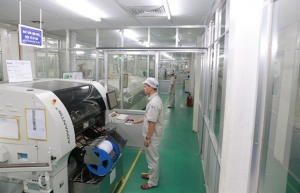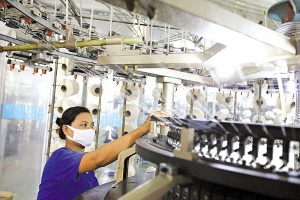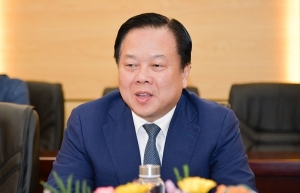State-owned groups keen on roadmaps for reform
“In recent times, state-owned enterprises (SOEs) haven’t been contributing as much as they once did,” said Phan Van Mai, Chairman of the People’s Committee of Ho Chi Minh City, at last week’s national conference to address SOE production, business, and investment improvements.
In Ho Chi Minh City alone, there are almost 50 SOEs. As of July, these enterprises boasted total assets of $4.43 billion with an equity capital of $3.16 billion. Their collective revenues for the first six months stood at $1.33 billion, with a profit of $205 million.
Harnessing the vast resources of these SOEs is imperative for Ho Chi Minh City’s economic growth, Mai stressed, adding that the private sector, inclusive of both private domestic groups and foreign direct investment, have also been expected, and even tasked, to stimulate economic growth.
Such a predicament is not solely Ho Chi Minh City’s cross to bear. The decline has echoes globally, influenced by international economic instability, political turbulence, and domestic operational challenges.
Aggregate revenue forecasts for the nation’s near-850 SOEs anticipate a sum of $59.78 billion this year, marking 4 per cent more than projections. Similarly, pre-tax profits are expected to rise 9 per cent, with a 7 per cent uptick in contributions to state coffers compared to the annual plan.
Yet, as Minister of Finance Ho Duc Phoc said, compared to 2022, this year’s revenue for SOEs represents just half of the previous year’s figure, with a 47.3 per cent decrease in pre-tax profit and a 32.9 per cent reduction in fiscal contributions. To provide context, 2022’s figures reflected a 29 per cent surge in revenue and a 24 per cent uptick in pre-tax profit over 2021.
The diminishing contribution is not merely a product of tougher business climates. Deputy Minister of Planning and Investment Tran Duy Dong hinted at a less than optimistic outlook for the next five years.
“The sluggish pace of new projects for SOEs has not provided the anticipated boost in capacity. Presently, they contribute about 29 per cent to the nation’s GDP,” Dong added.
Voicing his concerns to the prime minister, chairman of Vietnam Electricity (EVN) Dang Hoang An noted that even though EVN’s investment this year ranked among the top of all SOEs, totalling $2.32 billion in pure investments and $4 billion inclusive of debt repayments and interest, it still pales in comparison to previous years.
Furthermore, he highlighted the slow pace of fund disbursement so far this year, putting pressure on the rest of 2023.
“The prime minister’s emphasis has been on leveraging the resources within SOEs, bringing these resources swiftly into the economy,” An said. “The only way forward is increased investment. However, the current regulatory framework stands as a significant barrier.”
In the energy sector, An noted that the existing investment procedures are overburdened with bureaucratic red tape, leading to sluggish decision-making.
“Every economic group has its decree from the government, coupled with another decree for financial management. With these regulations and more, it’s challenging to function,” he said.
And even if these bureaucratic knots are untangled, the progression of many tasks hampers efforts. The Ministry of Planning and Investment reports that approvals are going slowly for restructuring projects, strategies, and business operation plans for 2021-2025.
To date, a plethora of Vietnamese premier SOEs remain in anticipation, as their strategic and operational roadmaps have yet to receive the nod from the Prime Minister’s Office.
The State Capital Management Committee, the body tasked with supervising enterprise operations, has green-lit the restructuring blueprints for a mere four enterprises: Vietnam Oil and Gas Group, the Vietnam Forestry Corporation, Vietnam Airports Corporation, and Vietnam Maritime Corporation.
Telecoms behemoth Viettel stands out as an exception in this quagmire. Despite being the lone player with an endorsed business strategy, its chairman and CEO, Tao Duc Thang, has voiced his concern.
“The delays cast a long shadow over our entire operational framework and our investment prospects for the foreseeable future. In the absence of a strategic compass, we’re essentially navigating blind,” Thang said.
Thang believes that SOEs’ total assets, which amount to over $160.34 billion operating across various sectors, could be put to better use. “If we can synergise these resources, the enterprises can contribute more significantly to the economy. For instance, Viettel and EVN recently collaborated to expedite the Thai Binh 2 thermal power plant’s operations,” he said.
 |
| Seminar State - Capital Management in Enterprises: Looking Back and Moving Forward On September 26, in collaboration with the Commission for the Management of State Capital at Enterprises (CMSC), VIR will organise a seminar titled “State Capital Management in Enterprises: Looking Back and Moving Forward” to commemorate the commissions’s fifth anniversary. Over those five years, the CMSC has reaffirmed the Party and state’s model and direction in enhancing transparent and efficient state capital management to meet the socioeconomic development needs of the country. This milestone has left a clear mark on the state-owned enterprise reform process. The seminar provides an opportunity for experts, managers, and business leaders to reflect on the committee’s 5-year journey and underscore the role of SOEs. It aims to propose directions and solutions to promote this vital economic arena. The seminar will be attended by various enterprises including Vietnam Oil and Gas Group, Vietnam National Chemical Group, VNPT, MobiFone, and more. |
 | Vietnam needs drastic SOE restructuring: experts Deputy Prime Minister Le Minh Khai has signed a decision to deepen the restructuring of state-owned enterprises (SOEs) in 2021-25. |
 | Government to divest 141 state-owned enterprises by 2025 The government plans to divest 141 state-owned enterprises in the 2022-2025 period to speed up the pace of equitisation and divestment post-COVID. |
 | The crucial plans ahead in 2023 for Vietnam’s state-owned enterprises While state-owned enterprises made strong efforts to recover during 2022, more tasks and plans are waiting for them in the path ahead to show their key role in the national economy. Nguyen Hoang Anh, chairman of the Commission for the Management of State Capital at Enterprises, talked to VIR’s Bich Thuy the 2022 story and 2023 plans to make better performance. |
What the stars mean:
★ Poor ★ ★ Promising ★★★ Good ★★★★ Very good ★★★★★ Exceptional
Related Contents
Latest News
More News
- A golden time to shine within ASEAN (February 19, 2026 | 20:22)
- Vietnam’s pivotal year for advancing sustainability (February 19, 2026 | 08:44)
- Strengthening the core role of industry and trade (February 19, 2026 | 08:35)
- Future orientations for healthcare improvements (February 19, 2026 | 08:29)
- Infrastructure orientations suitable for a new chapter (February 19, 2026 | 08:15)
- Innovation breakthroughs that can elevate the nation (February 19, 2026 | 08:08)
- ABB Robotics hosts SOMA Value Provider Conference in Vietnam (February 19, 2026 | 08:00)
- Entire financial sector steps firmly into a new spring (February 17, 2026 | 13:40)
- Digital security fundamental for better and faster decision-making (February 13, 2026 | 10:50)
- Aircraft makers urge out-the-box thinking (February 13, 2026 | 10:39)

 Tag:
Tag:















 Mobile Version
Mobile Version